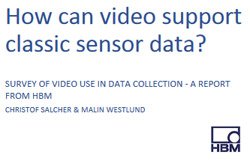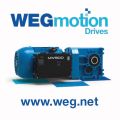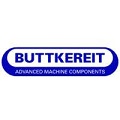
Posted to News on 8th Jun 2017, 13:45
HBM research shows video in data collection is increasing
A recent survey conducted by HBM shows that video use is accelerating in data collection. The study shows that almost half of the respondents (47 per cent) already use video in data recording today, while 54 per cent of the respondents expect video use within their organisation to increase in the next year.

Video cameras are already used in many test and measurement applications throughout the industry in addition to data collection with traditional tactile sensors. But until now, there has been very little information on the level and nature of this use.
Christof Salcher, Product Manager Instrumentation at HBM comments: "Based on the study there is no longer any question that recording video data in parallel to tactile sensors or digital bus signals is becoming more and more attractive to users. Video supports traditional sensor data and is becoming a valuable source of additional information, making the room for interpretation even narrower in testing".
In summary, the survey by HBM shows:
- Video is most commonly used in structural durability, fatigue testing (48 per cent). Machine monitoring or general lab testing (30 per cent) and mobile data acquisition or road load data acquisitions (28 per cent) are also relatively common areas of application.
- The most common reason for using video in data collection is to gain additional input analysing unexpected deviations (73 per cent). Other common reasons are decision finding (50 per cent) and visualisation of results to management (41 per cent).
- Regular video (such as webcams) is by far the most common equipment for video in data collection. In the survey, 80 per cent of respondents use this type. High-speed video is used by over a third of the respondents (36 per cent), often in combination with traditional video.
- Video in data collection is likely to increase substantially in the next years - this is indicated by both sides; by those already using video today and by those who do not. In total, 54 per cent of all the respondents expect video use in data collection within their organisation to increase. Among non-users that amounts to 37 per cent.
- Use brings more use - those already using video are more prone to increase their usage within the next years (76 per cent). Of those 50 respondents expecting to increase their use of video in data, a majority (69 per cent) predicts a substantial growth of 10-50 per cent. None of those already using video expect the video usage to decrease in the next year.
Christof Salcher concludes: "As the tactile and non-tactile worlds of data collection come together, there is not a question of using either video or traditional sensor data - but of both. Going forward, we will see sensors and video integrated together into data acquisition systems (DAQ) in more application areas over time, bringing valuable additional insight. HBM is very well positioned to face a growing demand in this area, already integrating video into a wide range of our applications."
The HBM survey was conducted in autumn 2016 among 100 respondents from Europe, with an emphasis on the Nordics. Download the full report here.
Millbrook Proving Ground
Station Lane
MK45 2RA
UNITED KINGDOM
+44 (0)1525 304980






























